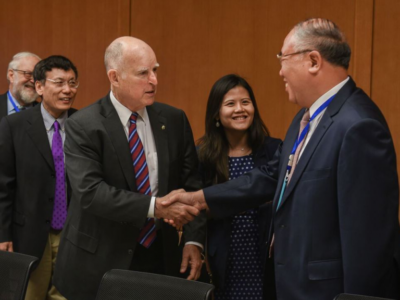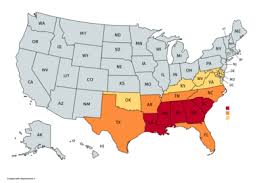The filibuster and climate change legislation
Should we eliminate the Senate filibuster to advance climate change legislation
As the Democratic Presidential primary season has unfolded, a number of the candidates have argued for eliminating the filibuster in the Senate completely. (It is currently gone for confirmation of nominations of judges and executive branch officials, but remains for substantive legislation.) So has former Democratic Senate Majority Leader Harry Reid. One of the key areas of legislation that advocates for abolishing the filibuster point to is climate change. And i...
CONTINUE READINGWhy is Newsom vetoing SB 1?
Comparing the Governor's statements with the text of the bill
The California legislature recently passed SB 1, which would translate into state law a range of federal environmental and worker safety standards that were in place before the inauguration of President Trump to protect against federal roll backs in those areas. However, Governor Newsom has indicated he will veto SB 1, on the grounds that the bill “does not . . . provide the state with any new authority to push back against the Trump administration’s environmenta...
CONTINUE READINGA New UC California-China Institute on Climate Change
China and the United States are the two largest emitters of greenhouse gases in the world, accounting for some 45 percent of global emissions. The world is unlikely to find a solution to climate change without aggressive action from both. With the Trump administration retreating from climate action, U.S. states and cities are pushing to fill the void with their own climate policies – and greater international engagement. At the University of California, a dedicated ...
CONTINUE READINGLaunching the California-China Climate Institute
Welcoming a famous new faculty member and a critical new initiative.
I have two exciting announcements to make. The first is that Jerry Brown has accepted an appointment as visiting professor at the law school and the College of Natural Resources (CNR) at Berkeley. That appointment would be exciting enough. But it goes hand in hand with my other news: the public launch of the California-China Climate Institute, which Governor Brown will chair. CCCI represents the fruits of his discussions with China’s top climate change official, ...
CONTINUE READINGWhy are automakers fighting Trump’s emissions rollback?
The answer may lie in the electric vehicle investments the industry is busy making
As we move ever deeper into an all-out legal war between California and the Trump Administration over rollbacks of automobile emissions standards (something Ann, Cara, and Julia have been covering very well), I want to explore in a little more depth why the automakers have been so resistant to Trump’s rollback efforts. The auto industry resistance is ironic, since, of course, it is their initial request to the incoming Trump Administration to weaken the Obama/Califo...
CONTINUE READINGDefending the Environment, Deep in the Heart of Dixie
It’s not hospitable territory for environmental work, but some law schools are still trying.
National environmental groups tend not to devote many resources to the Deep South. State governments and often courts are barren ground for environmental arguments. And.the local activist community is also thin. Law schools are also fewer in number than in the Northeast or Pacific Coasts. So what’s going on in those schools in the environmental area? There are many excellent individual scholars, but are there institutional efforts? When people talk about t...
CONTINUE READINGTeach Your Parents Well
A view from the Youth Climate Strike in S.F.
Youth Climate Strike signs and the young marchers holding them in San Francisco today were fed up, hopeful, witty and powerful—and offered helpful lessons to those of us entrusted with training the next generation of environmental advocates. Protesters offered concrete green visions (Only 363 offshore wind turbines needed to power the city of San Francisco); policy prescriptions (Put a price on it: Support H.R. 763); root-cause interventions (Please f*cking vote!); sec...
CONTINUE READINGWelcome to the Next Phase of the Great California-Trump Car Wars
First lawsuit filed, more to come
California didn't wait long to file its first court challenge to the rules just finalized by the Trump Administration related to California's GHG and ZEV car emissions standards (discussed here and here by Julia and Ann). Here's the complaint filed by California together with 23 other states, along with the cities of LA and NY. There's lots to say, but on quick reading here are some notable elements: It's not a challenge to the administration's decision to revok...
CONTINUE READINGGovernance infrastructure for water resilience
CLEE comments on Governor Newsom’s water portfolio executive order
Governor Gavin Newsom has directed state agencies to prepare a water resilience portfolio. Executive Order N-10-19 describes a set of broad principles to inform the development of the portfolio, as well as extensive outreach that should accompany the process, which is being conducted on an aggressive timeline. The EO states, correctly, that California needs a portfolio of collaborative strategies to meet water management challenges that will grow as a result of climat...
CONTINUE READINGEPA/Transportation Announcement of California Waiver Revocation is Full of Falsehoods and Irony
How Many Misstatements Can You Find?
This morning, the Environmental Protection Agency and Department of Transportation formally announced -- as expected -- that the Trump Administration is revoking California's waiver to set its own vehicle standards. Yesterday, Trump tweeted the news, coupling it with falsehoods claiming that the rollback would save lives and save consumers money. As I blogged yesterday, both are lies. Not to be outdone, today's EPA/DOT press release, with statements from EPA ...
CONTINUE READING








